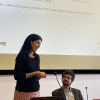Photo: The MedDMO project meeting at the University of Cyprus, chaired by Prof. Theodora Maniou. Prof. Ġorġ Mallia is second from left.
Journalistic fact-checking focuses on identifying disinformation and false claims made by organisations, public and political figures. This is essential in today’s information society and safeguards truth. The University of Malta, through its Department of Media and Communications, and The Times of Malta, are participating in an international project that facilitates this process.
The initiative is part of an EU-funded project establishing a Mediterranean hub of fact-checking organisations across Malta, Greece, and Cyprus, and involving the Agence France-Presse (AFP).
The project has been named MedDMO.
The fact-checking initiative began in the first months of 2023, with the Times of Malta also collaborating with the Department of Media and Communications to analyse the impact of disinformation campaigns around the Mediterranean and to develop tools to support journalists, students and the general public in identifying fake news.
Through their work as part of the MedDMO hub, Times of Malta and the University of Malta are collaborating with other international fact-checking organisations to create a shared network of resources and strengthen the accuracy of online content, while raising awareness about the dangers of misinformation.
Times of Malta’s fact-checking activities are being led by Mr Neville Borg, who has worked as a researcher in several institutional settings for over 10 years, in various fields, including Culture and the Arts, Health, Economics, and Digital Media. The University’s part is being led by Prof. Ġorġ Mallia, as head of the Department that is a partner in the project.
MedDMO was kicked off in a meeting in Thessaloniki, Greece in Decmber of last year, with the second meeing held in Nicosia, Cyprus at the end of March, 2023. The third project meeting will be held in Malta in October of this year, and will be hosted by the Faculty of Media and Knowledge Sciences. In the same month, trainers from the Agence France- Presse will be carrying out training in fact-checking, also in Malta. Regular online meeting keep the partners up to date. A website carries the fact-checks across the three countries, as well as information related to fact-checking and can be found online.
MedDMO forms part of the European Digital Media Observatory (EDMO), an independent observatory bringing together researchers, academics and media organisations to detect and analyse disinformation campaigns, organise media literacy activities, and support authorities in monitoring the digital media ecosystem. EDMO has been operating eight regional hubs across Europe and has now launched six new hubs (including MedDMO), expanding its coverage to all 27 EU Member States, as well as Norway.
The MedDMO project is funded by the EU’s Digital Europe programme and comprises several leading media organisations and academic institutions across the countries involved. The interdisciplinary MedDMO consortium is made up of: The Centre for Research and Technology Hellas (coordinating partner); Times of Malta; University of Malta, Agence France-Presse (AFP), Aristotle University of Thessaloniki; Athens Technology Centre, Ellinika Hoaxes; The University of Cyprus; and The Cyprus University of Technology.



